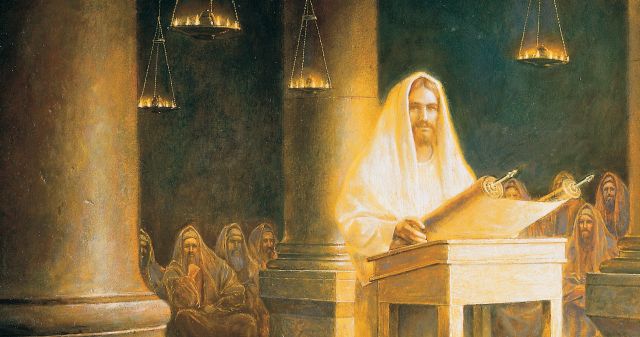Here is a collection of reliable resources to supplement your study of Isaiah 58–66 . FAIR Resources link to relevant questions which have been answered on the FAIR website. Other Resources link to resources outside of FAIR that are trustworthy and helpful. Under Church Resources you’ll find links to the different Come, Follow Me manuals, as well as other helpful links as applicable. Also on the page are the lesson summary and a guest scholar’s article. This week’s article is by Kerry Muhlestein and is titled Isaiah and Approaching God on the Day of Atonement.

Question: What is the best way to understand servitude in the Old and New Testaments?
Question: Did Joseph Smith prophesy that Jesus Christ would return in 1890?
FairMormon Questions: Why does Nephi quote from Isaiah in the Book of Mormon?
Find Answers on FAIRLATTERDAYSAINTS.ORG
ô INTERPRETER
Come, Follow Me — Old Testament Study and Teaching Helps
KnoWhy OTL29B — What Is the Significance of the Unusual Symbolism in Elisha’s Healings?
KnoWhy OTL28A — Is the Spirit of Elijah a Healing Power in Addition to Being a Sealing Power?
Scripture Roundtable: Old Testament Gospel Doctrine Lesson 28, “After the Fire a Still Small Voice”
ô BOM CENTRAL
Tyler Griffin & Taylor Halverson Come Follow Me Insights – 1 Kings 17-19: Elijah: Prophet of God
Taylor Halverson Elijah and the Widow at Zarephath (1 Kings 17) | Part 1/6
Jasmin Gimenez Rappleye The Stories of Elijah (1 Kings 17) | Part 2/6
Casey Paul Griffiths Elijah and the Prophets of Baal (1 Kings 18) | Part 3/6
Lynne Hilton Wilson Elijah the Prophet (1 Kings 18) | Part 4/6
John Hilton III The Trials of Elijah (1 Kings 19) | Part 5/6
ô BYU Studies
BYU Religious Education Discussions on the Old Testament: The Ministry of Elijah: 1 Kgs. 17-22
“Follow the Prophet”: Eight Principles from 1 and 2 Kings, Ronald E. Bartholomew, Religious Educator 9, no. 1
Elijah, LDS Sources and Ancient Sources, Franklin D. Day and R. J. Zvi Werblowdky, Encyclopedia of Mormonism
Elijah’s Mission: His Keys, Powers, and Blessings from the Old Testament to the Latter Days, E. Dale LeBaron, Sperry Symposium Classics: The Old Testament
I Will Send You Elijah the Prophet, Kenneth L. Alford, You Shall Have My Word: Exploring the Text of the Doctrine and Covenants
Priesthood Restoration Documents, Brian Q. Cannon and BYU Studies staff, BYU Studies 35, no. 4.
Who Controls the Water? Yahweh vs. Baal, Fred E. Woods, FARMS Papers
ô OTHER
The Scriptures are Real – Kerry Muhlestein
Elijah the Prophet and the Ba’al’s in Our LIves (week of June 27, second to listen to)
Kim Matheson on Elijah and the Still Small Voice in Our Lives (week of June 27, third to listen to)
Bible Project – Overview: 1-2 Kings

Lesson Summary
Early in His earthly ministry, Jesus Christ visited a synagogue in Nazareth, the village where He was raised. There He stood to read from the scriptures, opened the book of Isaiah, and read what we now know as Isaiah 61:1–2. He then announced, “This day is this scripture fulfilled in your ears.” This was one of the Savior’s most straightforward declarations that He was the Anointed One, who would “heal the brokenhearted” and “preach deliverance to the captives” (see Luke 4:16–21). This scripture was indeed fulfilled on that day. And, like many other prophecies of Isaiah, it continues to be fulfilled in our day. The Savior continues to heal all the brokenhearted who come unto Him. There are yet many captives to whom deliverance must be preached. And there is a glorious future to prepare for—a time when the Lord will “create new heavens and a new earth” (Isaiah 65:17) and “cause righteousness and praise to spring forth before all the nations” (Isaiah 61:11). Reading Isaiah opens our eyes to what the Lord has already done, what He is doing, and what He will yet do for His people.

Isaiah and Approaching God on the Day of Atonement
Day of Atonement
This week is the celebration of Yom Kippur, or the Day of Atonement. It takes place from sundown on Tuesday, October 4th, until sundown on Wednesday, October 5th. It is the holiest celebration in all the festivals the Lord commanded Israel to observe. You can read about it in Leviticus 16. This is the day where sacrifices were made to cleanse the tabernacle, everything in it, and all of Israel. One goat was sacrificed, and another had the sins of Israel symbolically transferred to it, and then that (scape)goat was driven into the wilderness. After these rituals and more, the high priest, representing all of Israel, could enter into the Holy of Holies and symbolically be reunited with the presence of God. This once-a-year ritual was the most significant event in the year.
The Purpose of Fasting
While today a ritual reunion with God in the Holy of Holies is not a possibility, since the temple no longer stands, the focus on overcoming separation from God remains a focus of the day. Rather than the ritual washings and sacrifices, fasting has become the primary method for drawing nearer to God. Because of this, one of the scriptures many observant Jews read on Yom Kippur is Isaiah 58, gleaning from its teachings about fasting. It is serendipitous that this week’s Come Follow Me reading includes that very chapter, so that we too can focus on how fasting can help us overcome our separation from God. Further, another chapter from this week’s reading also has a strong Day of Atonement tie. Thus, for this week’s essay, we will read excerpts from my commentary in Learning to Love Isaiah, for those two chapters.
Isaiah 58
58:3
“As a group who thinks they are being righteous and are truly approaching God as He had asked, Israel can’t understand why He doesn’t answer their prayers when they fast and inquire of Him. God answers and tells them why. Their fast isn’t sincere. At the same time, while they are fasting, they go about their normal day’s work and routine and seek the pleasures of the flesh. They are going without food, but they aren’t dedicating themselves in thought, prayer, and heart the way they should when sincerely fasting.. . .
58:6
“In a way we are enslaved to the tyranny of our need for food. Just as fasting temporarily releases us from that tyranny, it should be a time to focus on release from all forms of tyranny and bondage in which we find ourselves. Fasting should help us focus on how we can escape whatever worldly bonds to which we subjected ourselves. Finding freedom from some of the effects of the Fall is the focus of this kind of fast. Further, the fast should help relieve the burdens of the poor and oppressed.58:7
“One of the ways we can help break the tyranny of the need for food is to impart food to those who do not have it. As we choose to go without meeting some of our physical needs, we can help those who are unable to provide adequately for themselves.58:8
“In this verse, continuing through verse 12, Isaiah describes a series of great blessings available to those who engage in true fasting.
“When we fast in the right way, not to afflict ourselves but to break free of our worldly affliction and to help others break free of theirs, then we will find. It will feel as if light is springing upon us. We will feel the protection and power of God, who delivers us and brings us protection against those bonds we are trying to escape” (Learning to Love Isaiah, pp. 470-471).
Isaiah 61
“The first two verses of this chapter comprise the passage that Jesus read in the synagogue in Nazareth when he announced to them that He was the Messiah (see Luke 4:16–21). Clearly, they understood this to be a messianic prophecy, at least partially because the verse begins by saying that the speaker has been anointed (Messiah means “anointed one”). Yet the focus of this verse is more on redemption than any other Messianic aspect, for it surely refers to the Jubilee year. The law of Moses outlines that after 7 rounds of 7 years (49), the next year (the 50th) was a Jubilee year (see Leviticus 25:8–24). During that 50th year, on the Day of Atonement, the trumpet was to sound, “declaring” the Jubilee (or acceptable year). Isaiah even quotes part of Leviticus 25:10, which says that they are to “proclaim liberty” to those who had lost it. In the Jubilee year, those who had become captive slaves were to be given liberty, and those who had become imprisoned or enslaved due to default on debt were to be set free, and lands that had been sold to meet debt were to be returned, and the land was to rest as well. All of this is referred to in the first two verses of Isaiah chapter 61. The freeing of captives was known as redeeming them, and Christ is the Redeemer of Israel.
. . .The Jubilee Year
“The Jubilee aspects of these verses should not be underestimated. Surely in Isaiah’s day and thereafter it influenced how it was interpreted, and thus should also influence us. Are not all Israelites supposed to help with the liberation and freedom and rejoicing that comes in a Jubilee year? While these verses certainly apply to Christ, and probably to Isaiah as well, they surely apply to all Israelites who will follow the commands of God. Each covenant member, both ancient and modern, should do their part to provide liberty and freedom and restoration to all those in bondage. Each should provide rest and joy to the land and those in it. All this is possible because of Christ, but we each have a role to play in it as well. There are also connotations that God would deliver Israel when she was put into bondage, a meaning that undoubtedly was read into this passage during the Exile and in the days of Roman dominion during the Savior’s life.
“An example of Israel’s participation in this liberating process is provided in Jeremiah 34:8–10, when the leaders of Israel set at liberty all those whom they were commanded to free. Sadly, in Jeremiah 34:11, they undid their actions and reclaimed their servants and slaves. The Lord made it clear that their failure to proclaim liberty is partly why they were brought into captivity. Based on this example, perhaps this is what is meant by preaching the acceptable year of the Lord (the Jubilee year), and the day of vengeance of our God. Those who help set at liberty God’s children will find God’s comfort, but those who do not will experience His vengeance. He is ready to redeem those who will redeem but is angry with those who have experienced His covenant blessings but will not apply them to others in acts of covenant redemption” (Learning to Love Isaiah, pp. 493-93).
More Come, Follow Me resources here.

Kerry received his B.S. from BYU in Psychology with a Hebrew minor. He received an M.A. in Ancient Near Eastern Studies from BYU and his Ph.D. from UCLA in Egyptology, where in his final year he was named the UCLA Affiliates Graduate Student of the Year. His first full time appointment was a joint position in Religion and History at BYU-Hawaii. He is the director of the BYU Egypt Excavation Project. He has been teaching about Isaiah for almost three decades and has been teaching classes specifically on Isaiah for several years, and has written a verse-by-verse commentary on Isaiah. He and his wife, Julianne, are the parents of six children, and together they have lived in Jerusalem while Kerry has taught there on multiple occasions. His 2022 FAIR Conference presentation on “Keys to Understanding Isaiah” can be viewed here.
